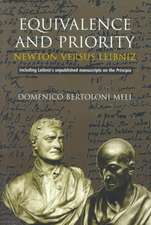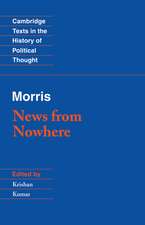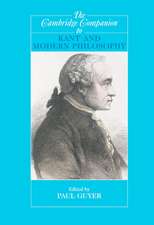Thomas Hobbes: Political Ideas in Historical Context
Autor Johann P. Sommervilleen Limba Engleză Paperback – 12 iul 1992
| Toate formatele și edițiile | Preț | Express |
|---|---|---|
| Paperback (1) | 263.27 lei 6-8 săpt. | |
| Bloomsbury Publishing – 12 iul 1992 | 263.27 lei 6-8 săpt. | |
| Hardback (1) | 952.01 lei 10-16 zile | +184.28 lei 7-13 zile |
| OUP OXFORD – 31 oct 2024 | 952.01 lei 10-16 zile | +184.28 lei 7-13 zile |
Preț: 263.27 lei
Nou
Puncte Express: 395
Preț estimativ în valută:
50.39€ • 54.39$ • 42.25£
50.39€ • 54.39$ • 42.25£
Carte tipărită la comandă
Livrare economică 19 aprilie-03 mai
Preluare comenzi: 021 569.72.76
Specificații
ISBN-13: 9780333495995
ISBN-10: 0333495993
Pagini: 248
Dimensiuni: 140 x 216 x 14 mm
Greutate: 0.32 kg
Ediția:1992
Editura: Bloomsbury Publishing
Colecția Red Globe Press
Locul publicării:London, United Kingdom
ISBN-10: 0333495993
Pagini: 248
Dimensiuni: 140 x 216 x 14 mm
Greutate: 0.32 kg
Ediția:1992
Editura: Bloomsbury Publishing
Colecția Red Globe Press
Locul publicării:London, United Kingdom
Notă biografică
JOHANN P. SOMMERVILLE is Associate Professor of History at the University of Wisconsin-Madison, and a former fellow of St John's College, Cambridge. His previous publications include Politics and Ideology in England, 1603-1640.
Cuprins
Preface List of Abbreviations Chronology PART 1: HOBBES AND HIS CONTEXT Introductory 1588-1640 1640-51 1651-79 PART 2: THE LAW OF NATURE AND THE NATURAL CONDITION OF MANKIND Self-preservation The State and Right of Nature The Laws of Nature and Justice-Covenants PART 3: THE ORIGINS OF GOVERNMENT AND THE NATURE OF POLITICAL OBLIGATION The Institution of a Commonwealth Conquest The Family and the State-Political Obligation PART 4: HOBBES ON SOVEREIGNTY AND LAW Sovereignty The Liberty and Property of the Subject Law and the Sovereign The Duties of the Sovereign PART 5: HOBBES ON CHURCH AND STATE What is Scripture? Ecclesiastical Power: the Case Against Bellarmine Ecclesiastical Power: De Cive, Leviathan and Anglican Thinking Excommunication and Erastianism PART 6: GOD, RELIGION AND TOLERATION God Faith, Salvation, Revelation, Prophecy and Miracles Toleration and Conscience Church History and Reformation Conclusion Notes Bibliography Index.
Descriere
Descriere de la o altă ediție sau format:
Hobbes's Elements of Law was written in 1640, on the eve of the English Civil War. It circulated in manuscript, and eleven manuscripts now survive. Two of them contain a substantial amount of material in Hobbes's own handwriting. Soon after writing it, Hobbes fled to France, while in England civil war broke out over many of the issues discussed by Hobbes in this book. In France he wrote a Latin version of his political theory (De Cive, on the Citizen), and then the English Leviathan, of which a Latin revision followed and in which he greatly expanded what he had to say about religion and church-state relations. The Elements of Law presents a complete but succinct version of Hobbes's political theory and of his more general philosophy. It analyzes the nature of knowledge and science, discusses psychology and human nature, surveys the rights and duties of individuals, and argues for the need of states to be governed by sovereign authority. It discusses the relationship between politics and religion, and the extent and limitations of political power. It is 'a work of extraordinary assurance, an almost fully fledged statement of Hobbes's entire political philosophy'. (Noel Malcolm) This edition is intended to replace the one edited by Ferdinand Tönnies (1889), from which that of J.C.A. Gaskin (Oxford World's Classics, 1994) derives. It establishes a more accurate text based on all the eleven known manuscripts, and includes much material omitted by Tönnies (who knew of only six manuscripts). It draws extensively on modern scholarship on Hobbes and his contexts.
Hobbes's Elements of Law was written in 1640, on the eve of the English Civil War. It circulated in manuscript, and eleven manuscripts now survive. Two of them contain a substantial amount of material in Hobbes's own handwriting. Soon after writing it, Hobbes fled to France, while in England civil war broke out over many of the issues discussed by Hobbes in this book. In France he wrote a Latin version of his political theory (De Cive, on the Citizen), and then the English Leviathan, of which a Latin revision followed and in which he greatly expanded what he had to say about religion and church-state relations. The Elements of Law presents a complete but succinct version of Hobbes's political theory and of his more general philosophy. It analyzes the nature of knowledge and science, discusses psychology and human nature, surveys the rights and duties of individuals, and argues for the need of states to be governed by sovereign authority. It discusses the relationship between politics and religion, and the extent and limitations of political power. It is 'a work of extraordinary assurance, an almost fully fledged statement of Hobbes's entire political philosophy'. (Noel Malcolm) This edition is intended to replace the one edited by Ferdinand Tönnies (1889), from which that of J.C.A. Gaskin (Oxford World's Classics, 1994) derives. It establishes a more accurate text based on all the eleven known manuscripts, and includes much material omitted by Tönnies (who knew of only six manuscripts). It draws extensively on modern scholarship on Hobbes and his contexts.
















